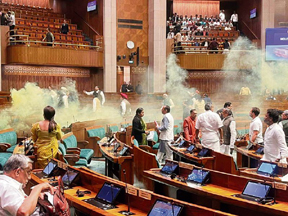
Donald Trump‘s return to the White House has been decidedly more overwhelming than the opening days of his first administration
“The first 100 days of an administration are about notching easy wins and deciding which tougher pushes to spend political capital on. But Trump is, as ever, burning through a pile of credit that far exceeds the collateral behind it. It’s a gambit that requires convincing anyone with the ability to push back on him that it won’t be worth checking his balance sheets. The sheer scope at which he is trying to act at once is a strategy designed for a sprint, not a marathon, in hopes of accomplishing as much as possible before anyone catches on that he’s spending beyond his political means.”

It has been one week since President Donald Trump was sworn in for the second time. The past seven days have been, at best, disorienting, as the new administration has jackknifed the country to the right so fast that the centrifugal force already feels crushing. In that time, Trump acted on his promise to unleash a wave of executive actions to begin transforming the federal government in his image.
After Trump’s win over then-Vice President Kamala Harris, many of the people I know felt numb or checked out, unable to contemplate what was coming. I told anyone who would listen that that feeling would change once the theoretical became practical and all the hypotheticals under discussion emerged into our new daily reality. A great wave of Americans has now checked back in at once — and the net effect is straining our collective mental capacity.
Beyond the policy shifts, though, the overall feeling of Trump’s ascension is different this time.
So far, Trump has pardoned or commuted the sentences of nearly every Jan. 6 rioter, including those who assaulted the Capitol Police. He has launched the first salvo in his quest to end birthright citizenship as guaranteed under the 14th Amendment. He has rushed to cut off immigration options for people who have been — as Republicans so often put it — waiting in line for their turn, and he has moved to enact mass deportations of those already here legally. His administration has threatened federal workers who work to improve diversity, issued a freeze on the Justice Department’s civil rights investigations, paused wide swaths of critical health research and commanded state and local officials to cooperate with his anti-immigrant sweeps or face prosecution.
Beyond the policy shifts, though, the overall feeling of Trump’s ascension is different this time. When he won in 2016, it was a surprise for virtually the entire country, the newly elected president included. Eight years ago, the narrow Electoral College win by this garish figure was seen as a likely fluke; the country’s economic anxiety had prompted a regretful mistake in selecting Trump (and let’s not forget, there was clear evidence of foreign interference). With the proverbial adrenaline pumping on the left, the backlash from the millions who hadn’t voted for him was immediate. The stumbles in his administration’s early days made his time as a national force feel like a frightening, but ultimately temporary, stumbling block in the nation’s progress.
This time it was impossible not to see what was coming in the event of a Trump win. The investigations and court cases surrounding his final days in office had laid bare his willingness to discard the Constitution in favor of retaining power. The Heritage Foundation’s Project 2025 was there for anyone to read, no matter how many denials and disavowals the campaign issued. After years of seeing Trump in office and out, even as the haze of nostalgia settled over Americans’ collective memory, there was no pretense about his being “a changed man.” If anything, Trump leaned into being himself, to the delight of his supporters. If his first win felt like being sucker punched rounding a corner, the second feels like having seen the threat coming from a mile away and been powerless to avoid it.
As a result, the country has shifted to accommodate his depredations this time around. “Trump’s cultural victory has lapped his political victory,” The New York Times’ Ezra Klein wrote recently, noting how the narrowness of the president’s victory over Harris doesn’t correlate to the deeper resentments it ostensibly tapped. “The election was close, but the vibes have been a rout. … In 2016, Trump felt like an emissary of the past; in 2025, he’s being greeted as a harbinger of the future.” That’s correct, but the “future” on offer is one of maximum regression to a darker past.
It is incumbent on his opponents not to let the present cacophony overwhelm their sense of purpose or focus. The depth of the shift hit hardest for me in a quote from White House press secretary Karoline Leavitt about Trump’s executive order on gender, which will affect trans and nonbinary Americans’ passports. “They can still apply to renew their passport — they just have to use their God-given sex, which was decided at birth,” Leavitt told NOTUS’ Oriana González. It was Leavitt’s use of “God-given sex” that threw me. Here was the chief spokesperson for the White House padding officially sanctioned bigotry with a religious justification. More concerning was the callousness with which she tossed it off, confident that it wouldn’t drive headlines or prompt any consequences for her.
This last week’s flurry of action has been an extended flex of the MAGA movement’s newfound sense of dominance. Several people have compared the blitzkrieg underway to the “shock and awe” campaign launched against Iraq at the onset of the U.S. invasion in 2003. (We’re unfortunately seeing today’s elected Democrats showing a similar instinct to follow the tide, fearing further electoral losses instead of standing up for what is right.) What begins now, though, is the administration’s long, hard slog to make these changes stick as part of its campaign of domestic nation-building. MAGA can only succeed by convincing enough of the populace that the changes Trump is making are inevitable and everlasting.
The first 100 days of an administration are about notching easy wins and deciding which tougher pushes to spend political capital on. But Trump is, as ever, burning through a pile of credit that far exceeds the collateral behind it. It’s a gambit that requires convincing anyone with the ability to push back on him that it won’t be worth checking his balance sheets. The sheer scope at which he is trying to act at once is a strategy designed for a sprint, not a marathon, in hopes of accomplishing as much as possible before anyone catches on that he’s spending beyond his political means.
It is incumbent on his opponents not to let the present cacophony overwhelm their sense of purpose or focus. It may take longer to overcome the inertia many are feeling with the crashing down of that wave we all saw coming, to marshal enough resistance to reach critical mass. In the meantime, there are legal challenges being filed to counter Trump’s unlawfulness and mutual aid is being organized in communities across America. The fate of our country will not be decided in the span of a week. The biggest threat is mistaking the scale of this opening salvo for anything more than the opening of a much longer struggle.
(Hayes Brown is a writer and editor for MSNBC Daily, where he helps frame the news of the day for readers. He was previously at BuzzFeed News and holds a degree in international relations from Michigan State University)




Be the first to comment